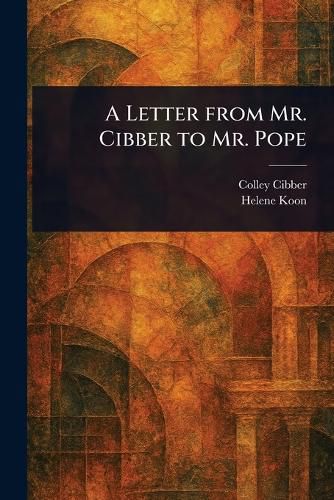Readings Newsletter
Become a Readings Member to make your shopping experience even easier.
Sign in or sign up for free!
You’re not far away from qualifying for FREE standard shipping within Australia
You’ve qualified for FREE standard shipping within Australia
The cart is loading…






This title is printed to order. This book may have been self-published. If so, we cannot guarantee the quality of the content. In the main most books will have gone through the editing process however some may not. We therefore suggest that you be aware of this before ordering this book. If in doubt check either the author or publisher’s details as we are unable to accept any returns unless they are faulty. Please contact us if you have any questions.
A fascinating glimpse into the heated literary landscape of 18th-century England, "A Letter from Mr. Cibber to Mr. Pope" offers a firsthand account of a notorious feud between two prominent figures: Colley Cibber and Alexander Pope. This intriguing correspondence provides valuable insight into the world of English drama and the often-contentious realm of literary criticism during this period.
Cibber, a successful actor-manager and playwright, directly addresses Pope, the celebrated poet, in this revealing letter. Their exchange illuminates the personal and professional rivalries that shaped the era's cultural scene. Readers interested in biography, literary history, and the intricacies of artistic disputes will find this meticulously prepared edition a compelling read. Delve into the world of 18th-century dramatists and their relationships through this unique historical document.
This work has been selected by scholars as being culturally important, and is part of the knowledge base of civilization as we know it.
This work is in the public domain in the United States of America, and possibly other nations. Within the United States, you may freely copy and distribute this work, as no entity (individual or corporate) has a copyright on the body of the work.
Scholars believe, and we concur, that this work is important enough to be preserved, reproduced, and made generally available to the public. We appreciate your support of the preservation process, and thank you for being an important part of keeping this knowledge alive and relevant.
$9.00 standard shipping within Australia
FREE standard shipping within Australia for orders over $100.00
Express & International shipping calculated at checkout
This title is printed to order. This book may have been self-published. If so, we cannot guarantee the quality of the content. In the main most books will have gone through the editing process however some may not. We therefore suggest that you be aware of this before ordering this book. If in doubt check either the author or publisher’s details as we are unable to accept any returns unless they are faulty. Please contact us if you have any questions.
A fascinating glimpse into the heated literary landscape of 18th-century England, "A Letter from Mr. Cibber to Mr. Pope" offers a firsthand account of a notorious feud between two prominent figures: Colley Cibber and Alexander Pope. This intriguing correspondence provides valuable insight into the world of English drama and the often-contentious realm of literary criticism during this period.
Cibber, a successful actor-manager and playwright, directly addresses Pope, the celebrated poet, in this revealing letter. Their exchange illuminates the personal and professional rivalries that shaped the era's cultural scene. Readers interested in biography, literary history, and the intricacies of artistic disputes will find this meticulously prepared edition a compelling read. Delve into the world of 18th-century dramatists and their relationships through this unique historical document.
This work has been selected by scholars as being culturally important, and is part of the knowledge base of civilization as we know it.
This work is in the public domain in the United States of America, and possibly other nations. Within the United States, you may freely copy and distribute this work, as no entity (individual or corporate) has a copyright on the body of the work.
Scholars believe, and we concur, that this work is important enough to be preserved, reproduced, and made generally available to the public. We appreciate your support of the preservation process, and thank you for being an important part of keeping this knowledge alive and relevant.